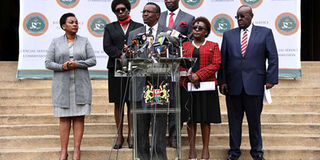High Court stops further reduction of Judiciary budget

Chief Justice David Maraga, flanked by members of the Judiciary Service Commission, addresses journalists at the Supreme Court on July 24, 2018, regarding budget cuts. PHOTO | FILE | NATION MEDIA GROUP
What you need to know:
- The judge asked the Judicial Service Commission to provide a report on how the cost-cutting has affected the dispensation of justice so far.
- According to Mr Yatani, the move is a cost-cutting measure targeting savings to support the Jubilee government’s Big Four agenda.
The Judiciary has won the first round of its battle with the Executive after the High Court stopped further slashing of its funds.
Justice Makau Mutua issued the order after the Law Society of Kenya (LSK) sued the National Treasury and the Attorney-General to protest against the budget cuts.
The judge asked the Judicial Service Commission (JSC) to provide a report on how the cost-cutting has affected the dispensation of justice so far.
“Pending the hearing and determination of this case, an order is hereby issued restraining the National Treasury, its agents, officers or any persons from implementing a September 24 circular or issuing any unwarranted directive with the same effect on the judiciary’s budget,” said Justice Mutua.
BUDGETARY CUTS
Treasury Cabinet Secretary Ukur Yatani had last month issued a directive proposing drastic budgetary cuts on recurrent and development spending of up to 50 per cent with regard to the Judiciary.
While the directive, which was issued via a circular that targeted all public agencies and proposed slashing of budget, some of the austerity measures that were set to be implemented include a ban on the use of government vehicles outside working hours, a halt on benchmarking tours and limiting delegations travelling with senior government officials.
According to Mr Yatani, the move is a cost-cutting measure targeting savings to support the Jubilee government’s Big Four agenda.
Mr Yatani had circulated the guidelines for the preparation of the financial year 2019/2020 supplementary estimates to all Cabinet Secretaries and accounting officers.
The circular also indicated there was underperformance in revenue collection in the financial year 2018/2019, which in turn would affect the baseline to be used in 2019/2020.
COURT SESSIONS
On October 9, the Chief Registrar of the Judiciary issued a memo about the circular to all directors, registrars, and heads of spending units as well as stations.
The memo indicated all mobile court sessions and service weeks planned between this month and the end of the year had been suspended until the budget is restored. Tribunal sittings also remain suspended.
LSK argues in the suit that the budget cut would greatly interfere with the independence of the Judiciary and the general dispensation of justice to Kenyans. Justice Mutua directed that the case be mentioned on November 6 for further directions.
Meanwhile, a memo at the courts in Nyeri County yesterday indicated that the Judiciary has halted provision of tea and newspapers to its staff, including judges and magistrates, owing to budgetary cuts. Payment of meal allowance has been suspended from November 1,2019.
Staff have also been directed to ensure all electronic devices such as computers are used sparingly and switched off when not in use.
AFFECTED VOTEHEADS
Further, heads of the financial spending units within the Judiciary have been asked to put in place measures to ensure efficient utilisation of the “available meagre resources”.
The affected voteheads include communication and transport, both domestic and foreign travel.
Others include printing, advertising and information supplies and services, training expenses, hospitality, office and general supplies.
Fuel, routine maintenance of vehicles, machines and other transport equipment, refurbishment of buildings and purchase of vehicles have also been affected.
Due to the stalemate between the Executive and the Judiciary, operations at the Court of Appeal in Nyeri also hang in the balance owing to the slashing of domestic travel allowances and shortage of judges.
This means that a three-judge bench cannot make regular visits to the region as has been the case in the past, all in efforts to clear a backlog of about 800 cases.
As of July 2018, the Judiciary had requested for Sh31.2 billion to fund its operations for that financial year. However, it was only allocated Sh17.3 billion.
The Judiciary at the time had anticipated Sh19.8 billion for recurrent expenditure, Sh11.4 billion for development and Sh891 million for the JSC.
JSC, Senate, Parliament and the International Commission of Jurists Kenyan Chapter are listed as interested parties in the case.






